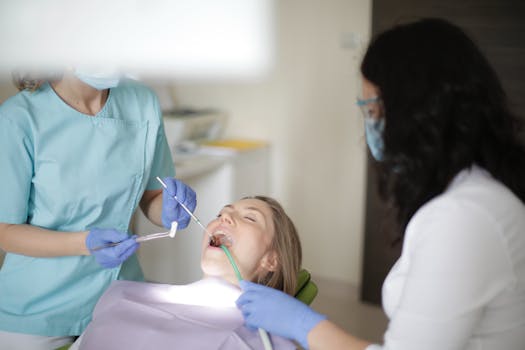Breakfast and Dental Health
In this blog post, we address the topic of breakfast – a meal that means far more than just the energy boost we need to start the day. We will also highlight the surprising and often overlooked consequences that regularly skipping breakfast can have on our periodontal health.



Periodontitis and Breakfast
Periodontitis, also known as gum disease, is a serious gum condition caused by bacterial infections that can ultimately lead to gum recession and even tooth loss. While many factors such as smoking, genetic predisposition, and poor oral hygiene are known to contribute to periodontitis, a new study in the Journal of Periodontology has shed light on another potential risk factor: skipping breakfast.
The Study in Detail
The study analysed data from the Korea National Health and Nutrition Examination Survey from 2016 to 2018 to investigate the link between breakfast habits and periodontitis. It was found that individuals who regularly skipped breakfast were significantly more likely to suffer from periodontitis than those who had breakfast daily. This association remained even after adjusting for other lifestyle-related risk factors such as smoking and alcohol consumption.
Potential Causes and Mechanisms
The study suggests that skipping breakfast may lead to dysregulation of sugar and fat metabolism, which in turn triggers systemic inflammatory processes in the body. These inflammations can put additional stress on the gums and promote the development of periodontitis.
- Blood Sugar Levels: Skipping breakfast often leads to higher blood sugar spikes after lunch and dinner. These spikes can enhance inflammatory processes in the body, which can negatively impact gum health.
- Lipid Metabolism: It was also observed that people who skip breakfast have elevated triglyceride levels. High triglyceride levels are associated with systemic inflammation, which can also affect the gums.
- White Blood Cell (WBC) Counts: Another interesting finding was the increase in WBC count in individuals who skip breakfast. An elevated WBC count is an indicator of active inflammation in the body, which in turn can increase the risk for gum inflammations.
Practical Implications for Dental Care
These findings emphasise the importance of a regular breakfast for general and periodontal health. By regularly consuming a nutrient-rich breakfast, metabolic processes can be normalised and inflammation in the body reduced, ultimately lowering the risk of periodontitis.
In practice, this means that a balanced diet rich in vitamins and minerals, combined with good oral hygiene, is crucial for preventing periodontitis and other dental issues. A well-thought-out breakfast that includes elements such as whole grains, proteins, healthy fats, and fresh fruits can therefore make a significant contribution to oral health.
Nutrition and Oral Health
It's no secret that a healthy diet is essential for overall and oral health. Nutrients like Vitamin D and Vitamin C are crucial for maintaining healthy gums and preventing periodontal diseases.
Breakfast Options for Healthy Teeth
- Oatmeal: A hearty breakfast with oatmeal provides energy throughout the day and helps keep blood sugar levels stable, preventing cravings.
- Buttermilk and Other Dairy Products: These are not only good sources of calcium but also important for maintaining strong tooth enamel.
- Raw Foods Such as Carrots and Apples: These can help remove plaque from teeth and promote saliva production, which has a natural cleansing action in the mouth.
Oral Hygiene and Dietary Habits
While a healthy diet is a fundamental basis for oral health, oral hygiene should never be neglected. Even the best dietary habits cannot fully counteract the negative effects of poor oral hygiene. Regular brushing, at least twice daily, is essential to remove plaque and prevent cavities as well as gum diseases such as periodontitis.
Moreover, the use of mouthwash plays a crucial role in combating bacteria that may remain in the mouth after brushing. Mouthwashes with fluoride or antibacterial agents can help keep the gums healthy and inhibit the growth of harmful bacteria.
Professional dental cleanings are also of great importance. These should be performed regularly to reach areas that are difficult to access with daily oral hygiene. Not only are tartar and stubborn deposits removed, but also stains caused by food, drinks, or smoking. This not only contributes to gum health but also improves the aesthetic appearance of the teeth.
For optimal oral health, we recommend regular visits to our ALPINE WHITE Studio. During a dental hygiene or oral health check, our specialised professionals examine the condition of your teeth and gums. They offer individually tailored treatments, specifically designed to meet your needs and conditions. A professional dental cleaning at regular intervals is not only key to preventing oral diseases but also an investment in your overall well-being.
Dental health in Germany, Switzerland, and all over Europe
In recent years, awareness of dental care and oral health has significantly increased in Europe, particularly in Germany and Switzerland. Organisations such as the German Society for Dental, Oral, and Maxillofacial Medicine emphasise how essential regular dental cleanings are to counteract caries and periodontitis. In urban centres such as Berlin and Zurich, there is a growing trend towards using professional dental cleaning services, reflecting the increasing prioritisation of oral health in these regions.
The influence of dietary habits on dental health
Global dietary trends, such as in the USA and Europe, which are high in sugars and acids, negatively impact dental health. Frequent consumption of fast food, fruit juices, and sodas promotes the development of caries, gingivitis, and damages tooth enamel. Additionally, an increase in type-2 diabetes is associated with these dietary habits. In contrast, countries like Japan, where the regular consumption of green tea is common, show different trends. The antioxidants in green tea can help reduce gum inflammation and combat bad breath, highlighting the global diversity in dietary habits and their direct impacts on dental health.
These connections between diet and oral health clearly show how important a conscious lifestyle is, not only for overall health but specifically for the health of our teeth and gums.
Final word
Choosing to skip breakfast should not be taken lightly, especially considering that the health impacts go far beyond a temporary feeling of hunger. A balanced diet, combined with conscientious oral hygiene, can significantly reduce the risk of periodontitis and lead to better overall health.


